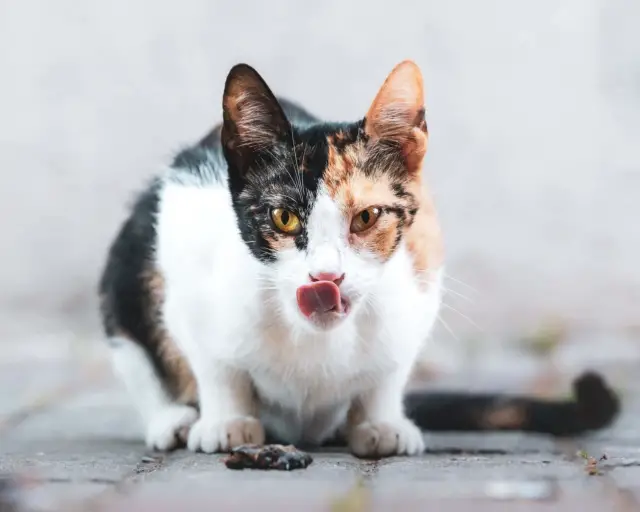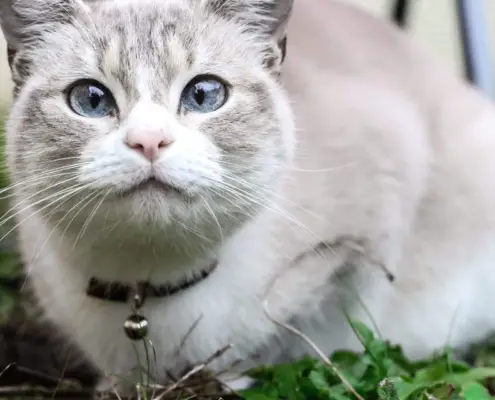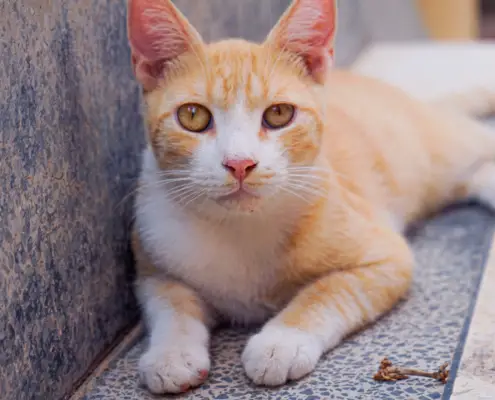
Cat urine odor is notorious for its strong and unpleasant smell. Have you ever wondered why cat pee smells so bad? It all comes down to the chemical composition of the urine and the unique biology of cats. Understanding the science behind cat urine odor can help you take effective measures to keep your home fresh and odor-free.
When cats urinate, they release a substance called urea, which contains ammonia. Ammonia is highly volatile and gives off a pungent smell. In addition to ammonia, cat urine also contains other compounds such as uric acid, which can contribute to the strong odor. The concentration of these substances in cat urine is much higher than in other animals, making the smell even more potent.
Moreover, cat urine contains pheromones, which are chemical signals that cats use to communicate with each other. These pheromones are released in the urine and can linger in your home, contributing to the persistent odor. Male cats, in particular, have stronger-smelling urine due to the presence of testosterone.
Understanding the science behind cat urine odor
To fully comprehend the science behind cat urine odor, it’s essential to understand the process of urine breakdown. When urine is first excreted, it is sterile and odorless. However, as it comes into contact with air, bacteria present in the environment start breaking down the compounds in the urine, releasing volatile gases that create the unpleasant smell.
The breakdown of urea in the urine by bacteria produces ammonia, which is responsible for the initial pungent odor. As the urine continues to decompose, the urea is converted into other compounds, including mercaptans and thiols, which contribute to the foul smell. The longer cat urine remains untreated, the stronger and more persistent the odor becomes.
It’s important to note that the age, diet, and health of the cat can also influence the odor of their urine. Older cats or those with certain medical conditions may produce urine with a stronger smell. Additionally, certain foods or medications can alter the odor of cat urine.
The importance of addressing cat urine odors
Cat urine odors can be more than just a nuisance. They can have a significant impact on the comfort and well-being of both you and your feline companion. Here are a few reasons why addressing cat urine odors is crucial:
- Health Concerns: Breathing in the strong fumes of cat urine can cause respiratory issues, especially for individuals with asthma or allergies. It can also lead to headaches and nausea.
- Reinforcement of Unwanted Behavior: If the smell of cat urine lingers in your home, it can encourage your cat to continue urinating in the same spot, perpetuating the problem.
- Social Embarrassment: Cat urine odors can be embarrassing when you have guests over. The foul smell can leave a negative impression and make your home unwelcoming.
- Maintaining a Clean Living Environment: Eliminating cat urine odors contributes to a clean and hygienic home, ensuring a healthy and pleasant living environment for both you and your cat.
By understanding the importance of addressing cat urine odors, you can take proactive steps to keep your home fresh and odor-free.
Tips for preventing cat urine odors in your home
Prevention is the key to managing cat urine odors in your home. By implementing these simple tips, you can significantly reduce the chances of encountering unpleasant smells:
- Clean the litter box regularly: Scoop the litter box daily and completely change the litter at least once a week. Cats are more likely to use a clean and well-maintained litter box, reducing the chances of accidents outside the box.
- Provide multiple litter boxes: If you have multiple cats, it’s crucial to have enough litter boxes in your home. The general rule of thumb is to have one litter box per cat, plus an extra one. This ensures that each cat has a designated space to do their business, minimizing accidents.
- Choose the right litter: Some litters have better odor-absorbing properties than others. Experiment with different types of litter to find one that effectively controls odors and is preferred by your cat.
- Ensure proper litter box placement: Place the litter box in a quiet and easily accessible area. Avoid placing it near food or water bowls, as cats prefer to keep their elimination area separate from their eating area.
- Address any underlying medical issues: If your cat suddenly starts urinating outside the litter box, it could be a sign of an underlying medical condition. Consult with your veterinarian to rule out any health problems that may be causing the inappropriate urination.
By following these preventive measures, you can reduce the occurrence of cat urine odors in your home and create a more pleasant living environment for both you and your furry friend.
Effective cleaning methods for cat urine accidents
Despite your best efforts, accidents can happen. It’s crucial to address cat urine accidents promptly and effectively to prevent lingering odors. Here’s a step-by-step guide on how to clean up cat urine:
- Act quickly: The sooner you address a cat urine accident, the easier it will be to remove the odor. Blot the urine with paper towels or a clean cloth to absorb as much liquid as possible.
- Use an enzymatic cleaner: Enzymatic cleaners are specifically designed to break down the compounds in cat urine, eliminating the odor at its source. Follow the instructions on the cleaner and thoroughly saturate the affected area.
- Avoid using ammonia-based cleaners: While it may seem counterintuitive, using ammonia-based cleaners can actually worsen the odor. The smell of ammonia can resemble cat urine, potentially encouraging your cat to urinate in the same spot again.
- Consider steam cleaning: If the cat urine has seeped into carpets or upholstery, steam cleaning can be an effective method to remove the odor. Steam penetrates deep into the fabric, killing bacteria and eliminating the smell.
- Test for residual odor: After cleaning, use your nose or a blacklight to check for any residual odor. If you still detect a faint smell, repeat the cleaning process or consult professional odor removal services.
By following these cleaning methods, you can effectively eliminate cat urine odors and prevent them from lingering in your home.
Natural remedies for removing cat urine odors
If you prefer to use natural remedies, several household products can help neutralize cat urine odors. Here are a few natural solutions you can try:
- White vinegar: Mix equal parts of white vinegar and water and spray it on the affected area. Vinegar helps neutralize the odor and can deter cats from urinating in the same spot again.
- Baking soda: Sprinkle baking soda over the affected area and let it sit for a few hours. Baking soda absorbs odors and can help eliminate the smell. Vacuum the area thoroughly afterward.
- Hydrogen peroxide: Mix one part hydrogen peroxide with two parts water and apply it to the affected area. Hydrogen peroxide has natural disinfecting properties and can help remove the odor.
- Citrus solutions: Cats dislike the smell of citrus. Squeeze some lemon or orange juice over the affected area or use citrus-scented cleaning products to deter cats from urinating there.
It’s important to note that while natural remedies can be effective, they may not completely eliminate the odor. If you’re dealing with persistent cat urine odors, you may need to consider other solutions or seek professional help.
Odor control products for cat owners
If you’re looking for additional assistance in controlling cat urine odors, numerous commercial products are available on the market. These products are specifically designed to tackle the strong smell of cat urine and keep your home fresh. Here are some odor control products that cat owners can consider:
- Odor-neutralizing sprays: These sprays contain enzymes and odor-neutralizing agents that help break down the compounds in cat urine and eliminate the smell. They can be sprayed directly on surfaces or in the air.
- Air purifiers: Air purifiers with activated carbon filters can help remove odors from the air, including cat urine smells. They work by trapping odor molecules and circulating clean air back into the room.
- Odor-absorbing powders: These powders can be sprinkled on carpets, upholstery, or litter boxes to absorb and neutralize cat urine odors. They are typically left for a period of time and then vacuumed or cleaned away.
- Litter additives: Some cat litter brands offer odor-controlling additives that can be mixed with the litter. These additives help absorb odors and prevent them from spreading throughout your home.
When choosing odor control products, consider your specific needs and preferences. It’s also important to read product labels and follow the instructions for optimal effectiveness.
Hiring professional odor removal services
If all else fails and you’re still struggling with persistent cat urine odors, it may be time to seek professional help. Professional odor removal services specialize in eliminating strong odors, including those caused by cat urine. These professionals have the expertise and specialized equipment to effectively treat and remove the odor from your home.
When hiring professional odor removal services, consider the following:
- Experience and reputation: Look for companies with experience in odor removal, preferably those that have dealt with cat urine odors before. Read reviews and ask for recommendations from friends or fellow cat owners.
- Methods and products used: Inquire about the methods and products used by the odor removal service. Ensure they use safe and effective techniques that won’t harm your home or pets.
- Cost and time-frame: Request a quote from the odor removal service and inquire about the estimated time it will take to eliminate the odor. Compare prices and timelines from different companies to make an informed decision.
Hiring professional odor removal services can be a more costly option, but it can provide a comprehensive solution for persistent cat urine odors that are difficult to eliminate on your own.
Creating a cat-friendly litter box area
Aside from understanding the science behind cat urine odor and implementing preventive measures, creating a cat-friendly litter box area can significantly contribute to odor control. Here are some tips for setting up a cat-friendly litter box area:
- Choose the right litter box: Cats have preferences when it comes to litter boxes. Consider the size, depth, and accessibility of the litter box. Some cats prefer covered litter boxes, while others prefer open ones. Experiment with different options to find what works best for your cat.
- Provide privacy: Cats value their privacy when using the litter box. Place the litter box in a quiet and secluded area where your cat can eliminate undisturbed.
- Keep it clean: Cats are naturally clean animals and prefer a clean litter box. Scoop the litter box daily and change the litter regularly to maintain cleanliness and freshness.
- Consider litter box liners: Litter box liners can make cleaning the litter box easier and prevent urine from seeping into the bottom of the box. However, some cats may dislike the texture of liners, so observe your cat’s preferences before using them.
- Offer multiple litter box options: If you have a large home or multiple floors, consider placing litter boxes on each level to provide convenient access for your cat. This reduces the chances of accidents occurring outside the litter box.
By creating a comfortable and cat-friendly litter box area, you can encourage proper litter box usage and minimize the occurrence of cat urine odors in your home.
Conclusion
Understanding why cat pee smells bad is the first step towards effectively managing and preventing cat urine odors in your home. By comprehending the science behind cat urine odor, addressing the importance of odor control, implementing preventive measures, using effective cleaning methods, exploring natural remedies, and considering odor control products or professional services, you can create a fresh and odor-free living environment for both you and your feline companion. Remember to prioritize the health and well-being of your cat while maintaining a clean and hygienic home. With proper care and attention, you can keep your home fresh and free from the unpleasant smell of cat urine.
If you enjoyed my article, I would appreciate you sharing it with your network.

Sima Ndlebe
Sima writes for CatBuzz. He is interested in Cats, Health and Fitness, and Entrepreneurship.
Published: 31 October 2023
Related Articles
Disclaimer
The content found on CatBuzz.org is presented on an "as is" basis and is intended for general consumer information and education purposes only. Any utilization of this information is voluntary and solely at the user's own risk.
None of the articles or content should be regarded as, or used in place of, veterinary medical advice, diagnosis, or treatment. The information provided on the website is purely for educational and informational intentions and should not be considered a substitute for professional guidance from a veterinarian or other qualified expert. The articles are designed to inform consumers about veterinary healthcare and medical matters that may impact their cat's daily life. It should be noted that this website and its services do not constitute the practice of any form of veterinary medical advice, diagnosis, or treatment. CatBuzz.org explicitly disclaims any liability for any direct or indirect damages or losses that may arise from the use of or reliance on the information contained within the content.
Consumers must consult a veterinarian, veterinary specialist, or another qualified veterinary healthcare provider when seeking advice regarding their cat's health or medical conditions. It is important not to ignore, avoid, or postpone seeking medical advice from a veterinarian or other qualified veterinary healthcare provider solely based on information obtained from this website. If you believe that your cat may be experiencing a medical issue or condition, it is imperative to promptly contact a qualified veterinary healthcare professional.




